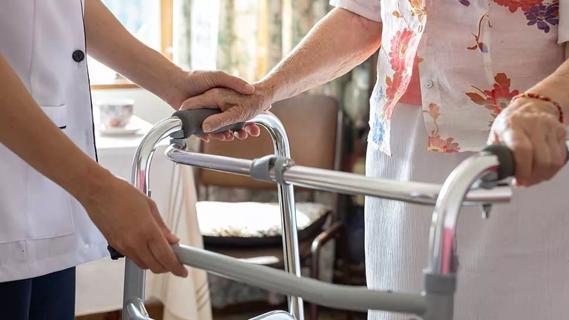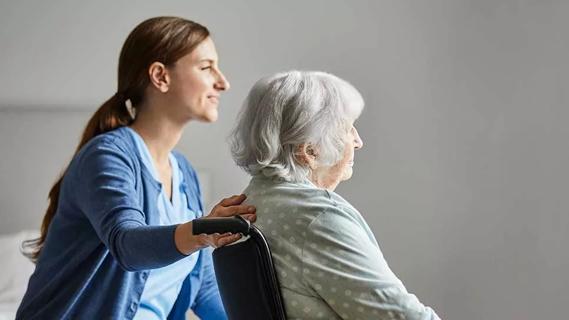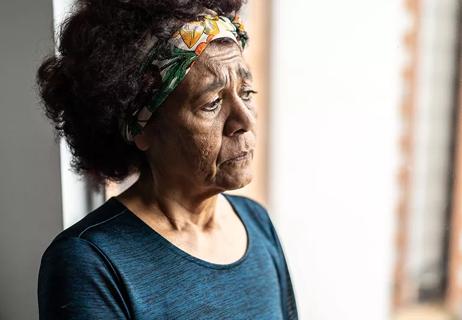This connection is yet another reason to seek help for OSA

Sleep apnea — a sleep disorder in which your breathing is briefly and repeatedly interrupted during sleep — may be doing more than affecting the quality of your sleep and making you tired.
Advertisement
Cleveland Clinic is a non-profit academic medical center. Advertising on our site helps support our mission. We do not endorse non-Cleveland Clinic products or services. Policy
A recent study found a long-suspected connection between sleep apnea and Alzheimer’s disease. Researchers found damage in the brain starts in the same place and spreads the same way in both Alzheimer’s disease and in sleep apnea.
The American Sleep Apnea Association reports more than 25 million Americans have sleep apnea and 1 billion have obstructive sleep apnea (OSA) worldwide. The word apnea refers to a breathing pause that lasts at least 10 seconds. This can occur in those who snore, have generalized fatigue or consistently-poor quality of sleep.
“Today, we are recognizing that sleep disorders beyond sleep apnea also play an important role in neurodegeneration, like reduced sleep and circadian rhythm disruption,” says sleep medicine specialist Reena Mehra, MD.
Read on to find out more about the connection between sleep apnea and cognitive decline.
Mild cognitive impairment is when your memory is affected to the point that it’s noticeable to others, but not enough to affect your daily life. People with mild cognitive decline may show some forgetfulness or amnesia of recent events. They often need to write notes to remind themselves to do things that they would otherwise forget.
Advertisement
The connection between sleep apnea and cognitive decline has long been suspected. But researchers recently confirmed that those who had sleep-disordered breathing had an earlier onset of mild cognitive impairment compared with people who didn’t suffer from OSA.
What’s more, other studies have shown those with sleep apnea were diagnosed with mild cognitive impairment an average of 10 years earlier than people without sleep breathing problems. And numerous other studies have made the connection between sleep apnea and dementia.
But there is hope. Researchers also found that people who treated their sleep breathing problems with a continuous positive airway pressure machine, or CPAP, were diagnosed with memory and thinking problems about 10 years later than people whose problems were not treated.
“CPAP is the treatment of choice for sleep apnea,” Dr. Mehra says. With this treatment, you wear a face or nasal mask while you sleep. The mask is connected to a pump and provides a flow of air into your nasal passages to keep your airways open.
We’ve all known someone who snores — perhaps your partner or a close relative. This is just one thing to look out for. “People who are taking care of older individuals or those with sleep issues should be aware of sleep apnea,” she says.
If you live with or care for someone who has trouble sleeping, ask yourself the following questions to figure out whether screening for sleep apnea is needed:
If you or your loved one identifies with one or more of those questions, talk with your physician about whether screening for sleep apnea is appropriate.
Advertisement

Sign up for our Health Essentials emails for expert guidance on nutrition, fitness, sleep, skin care and more.
Learn more about our editorial process.
Advertisement

Studies show the medication may have a protective effect, but more research is needed

Research suggests that up to 45% of current Alzheimer’s cases may have been avoidable

It’s critical to understand the wishes of your loved one and seek their involvement whenever possible

Your loved one may need help with daily activities, managing nutritional challenges and adapting their living space

Finding the causes of weight loss is key to treatment

Prevention and preparation can help you keep your loved one safe

Research on better diagnosis and treatment continues

To avoid sleep deprivation and shift work sleep disorder, try adopting habits that minimize light exposure and prioritize daytime sleep

Although it could be used as a moisturizer, this new trend is not recommended

Communicating clear limits helps protect your time, energy and emotional well-being

High cholesterol can be genetic, but testing and treatment can lower your heart disease risk